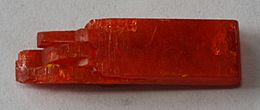Lópezite facts for kids
Quick facts for kids Lópezite |
|
|---|---|
 |
|
| General | |
| Category | Sulfate minerals (chromate) |
| Formula (repeating unit) |
K2Cr2O7 |
| Strunz classification | 7.FD.05 |
| Dana classification | 35.2.1.1 Anhydrous chromates |
| Crystal symmetry | P1 |
| Identification | |
| Color | Orange-red, red |
| Crystal habit | Granular or spherical in small crystals on the natural environment. Prismatic on lab grown crystals. |
| Crystal system | Triclinic |
| Cleavage | Perfect [010] perfect, [100] distinct, [001] distinct |
| Mohs scale hardness | 2+1⁄2 |
| Luster | Vitreous |
| Streak | Light yellow |
| Diaphaneity | Transparent |
| Specific gravity | 2.69 |
| Pleochroism | Visible |
| Solubility | soluble in water |
| Other characteristics | Important: This mineral contains chemicals that can be harmful if not handled carefully. |
Lópezite is a very rare mineral. It is known for its bright red or orange-red color. Lópezite is a type of chromate mineral. Its chemical formula is K2Cr2O7. This means it contains potassium, chromium, and oxygen. It forms crystals in a shape called the triclinic crystal system.
Contents
Where Lópezite Is Found
Lópezite is found in special places. It usually appears as small crystals. These crystals fill tiny spaces called vugs. These vugs are found inside nitrate ores. Nitrate ores are rocks rich in nitrogen compounds.
Natural Locations
Lópezite is mainly found in the Atacama Desert in Chile. Here, it grows alongside other minerals. These include tarapacáite, dietzeite, and ulexite. It has also been reported in South Africa. There, it is found in a large rock formation called the Bushveld igneous complex.
How Lópezite Was Discovered
Lópezite was first found in 1937. This discovery happened in the Iquique Province of Chile. The mineral was named after a Chilean mining engineer. His name was Emiliano López Saa. He lived from 1871 to 1959.
Natural vs. Man-Made Lópezite
Most of the lopezite you might see for sale is not natural. It is often made in a lab. Scientists can grow lopezite crystals. These man-made crystals can look a bit different. They sometimes form in a monoclinic shape. This is different from the natural triclinic shape.
See also
 In Spanish: Lopezita para niños
In Spanish: Lopezita para niños
 | Shirley Ann Jackson |
 | Garett Morgan |
 | J. Ernest Wilkins Jr. |
 | Elijah McCoy |

